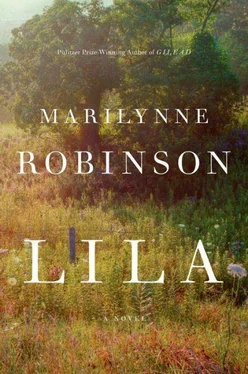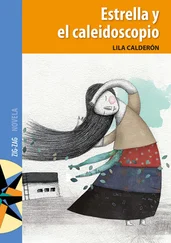It seemed like that girl knew everything. Mellie. She could bend over backward till her hands were flat on the ground. She could do cartwheels. She said, “I know that woman ain’t your mama. She telling you things your mama would have told you already. Don’t go sucking on your hand? Like you was a baby? You probly an orphan.” She said, “I used to know an orphan once. Her legs was all rickety. Same as yours. She couldn’t talk neither. That’s probly why she was an orphan. She sort of turned out wrong.”
Mellie was curious about them, if the others were not. She would drift back to walk with them, and she would put her face close up to the child’s face, to stare at her. “She got that sore on her foot. That’s one thing. Put some dandelion milk on it. I got some here. I bet I could carry her. I could.” She’d be eating the bloom of a dandelion, the yellow part, or chewing red clover. She was pretty well brown with freckles, and her hair was almost white from the sun, even her eyebrows and eyelashes. “I hate these old coveralls. The boys about wore ’em out and now I’m wearing ’em. They’re mostly just patches. Doane says they’re better for working. I got a dress. My ma’s going to let the hem down.” And then she’d be off, walking on her hands.
Doll said, “She likes to pester. Don’t you mind.”
Lila didn’t talk then. Doll said, “She can. She just don’t want to.” It was partly that Doll gave her anything she needed. She still woke her up in the night sometimes to give her a morsel of cold mush. And Lila never even knew there was such a thing as cussing, till that old woman told her. It just meant leave me alone, most of the time. Once, she told that old woman she wisht she was in hell with her back broke, and the old woman yanked her up and gave her a swat and said, You got to stop that cussing. She’d gone off somewhere and come back with a little bottle of medicine for the sore on the child’s foot that didn’t heal, and it did smart when she put it on, but it hurt her feelings that the child would be hateful about it. Lila didn’t know where to hide, so she just went into a corner and curled up as small as she could, with her eyes shut tight. The old woman said, “Oh, mercy! Doll, come in here! She’s back in the corner again. Was there ever such a child!”
Doll came in and knelt down by her, smelling of sweat and sunshine, and lifted her into her lap. She whispered, “What you doing now, biting on that hand like a little baby!” The old woman brought the shawl, and Doll put it around her. And the old woman said, “She’s your child, Doll. I can’t do a thing with her.”
* * *
They never spoke about any of it, not one word in all those years. Not about the house Doll stole her away from, not about the old woman who took them in. They did keep that shawl, though, till it was worn soft as cobwebs. But she felt the thrill of the secret whenever she took Doll’s hand and Doll gave her hand a little squeeze, whenever she lay down exhausted in the curve of Doll’s body, with Doll’s arm to pillow her head and the shawl to spread over her. Years after she had become an ordinary child, if there were going to be people to deal with, Doll would whisper in her ear, “No cussing!” and they would laugh together, enjoying their secret. They didn’t even mention the nights they spent bedded down beyond the light of Doane’s fire, or the days walking behind Doane’s people, at a distance, as if they only happened to be going along on the same road.
They could keep to themselves because they had a bag of cornmeal and a little pot to cook it in. Every night Doll made a fire. As she walked she’d be looking for things they could eat. She caught a rabbit in her apron and killed it with a stone, and cooked it that night with a mess of pigweed. She found a nest of bird’s eggs. She found chicory and roasted the roots, which were medicine, she said, a cure for the bellyache. Then finally one morning she took up the child and walked after Doane’s people into a field of young corn and started pulling weeds in the rows where their hoes couldn’t reach, and they didn’t say a thing to her about it. The child stayed beside her, holding on to her skirt. When Marcelle brought a pail of well water for the others, she brought it to them, too. Doll thanked her, and held the cup to the child’s lips, and then she wiped her hand on her dress and dipped her fingers into the cup to wet them and rinse dust from the child’s face. Cold drops ran down her chin and throat and into the damp of her dress, and she laughed. Doll said, surprised, “Well, listen to you now!”
Marcelle was standing there, watching them, waiting to get the cup back. “I guess she been poorly for a while?”
Doll nodded. “She been poorly.”
“She could ride in the wagon. You got a lot to carry.”
“I keep her by me.”
“Then set your bedroll in the wagon.”
Doll never did put herself forward, but the next morning, when she had everything bundled up, Doane came and took it and set it on the wagon bed. He said, “We got some spuds in the ashes, ma’am. If you care to join us.”
And after that she and Doll were Doane’s people, too, most of the time, for as long as the times were decent. That would have been about eight years, counting backward from the Crash, not counting the year Doll made her go to school. Their own bad times started when the mule died, two years or so before everyone else started getting poorer and the wind turned dirty. It seemed like the whole world changed just at that time, the mule gone first, which made the wagon useless. They couldn’t even sell it, and they had to leave most of their things behind. The creature died on a lonely piece of road where they would not have been in the first place if it had shown any sign at all of what was about to happen to it. It just sank down on its knees and went over on its side while Arthur was trying to put it in the traces.
* * *
Lila heard about the Crash years after it happened, and she had no idea what it was even after she knew what to call it. But it did seem like they gave it the right name. It was like one of those storms you might even sleep through, and then when you wake up in the morning everything’s ruined, or gone. Most of the farmers that used to know Doane and Marcelle sold up and left, or just left, and the ones who stayed didn’t want any help, or couldn’t pay for it. But there were those few years when it seemed that they knew who they were and where they should be and what they should be doing. There were those few years when the child began to be strong and to grow, when Doll was still herself, when Mellie still pestered and played her pranks like some half-grown devil trying to mind its manners. Evenings Doane might be away from the camp a while, somewhere trading one thing for another for some small mutual advantage or settling terms with somebody for the work they would do. When he came back again he’d look for Marcelle, never saying a word, but when he saw her he would go and stand near her, and then whatever else might have been on his mind you could tell he was pretty well at peace.
They all thought it was a fine thing to live the way they did, out in the open like that, when the weather was tolerable. It seemed true enough as long as the good times lasted. If they were tired and dirty it was from work, and that kind of dirt didn’t even feel like dirt. Work meant plenty to eat and a few pennies for candy or ribbons or a dime for a minstrel show when they passed through a town. They never camped by a stream without bathing, and washing their clothes if the weather was good and they could stay long enough to let things dry. That was before the times when they began to be caught in the dust, and it would make them cough and cough, and the wind would blow it right through the clothes on their backs. But in those days they were proud people. If they could, they patched and mended and hemmed whatever needed it. They looked after what they had. Anybody could see that.
Читать дальше












